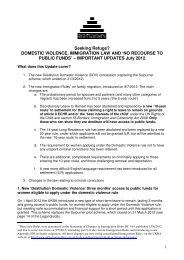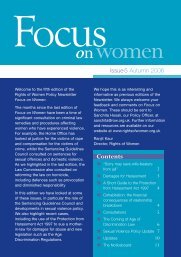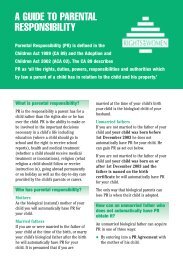Seeking Refuge? - Rights of Women
Seeking Refuge? - Rights of Women
Seeking Refuge? - Rights of Women
You also want an ePaper? Increase the reach of your titles
YUMPU automatically turns print PDFs into web optimized ePapers that Google loves.
5<br />
Your Asylum Interview<br />
Introduction<br />
All applications for asylum are considered by the<br />
UK Border Agency 17 . There are currently two<br />
systems in operation for deciding claims for<br />
asylum: the New Asylum Model (NAM) and the<br />
Case Resolution Directorate (CRD). See Chapter<br />
6 for information about the Case Resolution<br />
Directorate.<br />
Some cases were dealt with under NAM from May<br />
2005. From 5th March 2007, all new claims for<br />
asylum will be dealt with through NAM.<br />
Under NAM there are currently two systems for<br />
determining applications, general casework (see<br />
Chapter 3) and the detained fast-track (see<br />
Chapter 4).<br />
Whichever process you go through, your asylum<br />
interview is very important, as it is your chance<br />
to explain why you need protection in the UK.<br />
The law discussed here is very complicated.<br />
This Chapter is written to give you information<br />
about the law, but it is not legal advice. If you<br />
have applied for protection in the UK, or are<br />
thinking about doing this, it is very important<br />
that you seek legal advice from a solicitor or<br />
immigration advisor. You can also contact<br />
<strong>Rights</strong> <strong>of</strong> <strong>Women</strong>’s legal advice line. For<br />
information about organisations that provide<br />
legal advice, see Chapter 12 at the end <strong>of</strong> this<br />
book.<br />
The interview<br />
Decisions about who should be given protection<br />
in the UK are initially taken by case-owners in the<br />
UK Border Agency. Case-owners also carry out<br />
asylum interviews.<br />
“<br />
The case-owner is the person<br />
under NAM who is responsible<br />
for your case. You may have<br />
one case-owner throughout<br />
your case or you may have<br />
different case-owners at<br />
different stages in the process.<br />
Case-owners have a number <strong>of</strong> responsibilities<br />
including:<br />
- Meeting you at your first reporting event.<br />
- Being responsible for any reporting<br />
conditions that are imposed on you.<br />
- Conducting your asylum interview.<br />
- Working with your legal representative to<br />
clarify the issues in the case.<br />
- Controlling the progression <strong>of</strong> your case by<br />
altering the times that certain things are<br />
done (for example, the date <strong>of</strong> the<br />
interview), if flexibility is required.<br />
- Making an initial decision on whether you<br />
should be granted protection in the UK or<br />
whether your claim should be refused.<br />
- Ending your case by either assisting you with<br />
your integration in the UK or arranging for<br />
your re-documentation and removal.<br />
Your legal representative (or you, if you don’t<br />
have a legal representative) should be in close<br />
contact with your case-owner(s) throughout<br />
the process.<br />
”<br />
17<br />
It used to be called the Border and Immigration Agency (the BIA) and before that the Immigration and Nationality Directorate<br />
(the IND).<br />
31
















